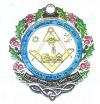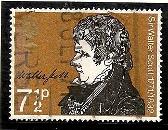



|
Did you know? Masonic Philately |



|
Sir George Cathcart No. 617 |

|
Sir Walter Scott. (1771–1832) Scottish Novelist and Poet.
He gained a European reputation for his historical novels such as Waverley 1814, The Heart of Midlothian 1818, and Ivanhoe 1819, all published anonymously. His last years were marked by frantic writing to pay off his debts, after the bankruptcy of the printing and publishing business of which he was a partner.
He was created a baronet 1820. Scott exerted a strong influence on the imaginative life of his country. He stimulated an interest in Scottish history and materially affected the literary movement of his time. Scott was born in Edinburgh. He was crippled for life following an early attack of poliomyelitis. Educated at Edinburgh University, he became a lawyer, and in 1799 was appointed a sheriff-depute of Selkirkshire.
In 1820 Scott was elected president of the Royal Society of Scotland.
In 1826 he was involved in financial ruin through the bankruptcy of Constable, his chief publisher, with whom fell Ballantyne & Co, the firm of printers and publishers in which Scott had been for many years a partner. How far Scott was legally responsible is a matter of controversy, but he felt himself under a moral obligation to satisfy the firm's creditors, and at the age of 55 set himself the heroic task of paying off the enormous debt of £114,000. The Fair Maid of Perth, Tales of a Grandfather 1828–31 (a history of Scotland), and Letters on Demonology and Witchcraft 1830 are among the chief products of these last painful years; his last two novels, Castle Dangerous 1832 and Count Robert of Paris 1832, are much inferior. Continuous overwork ended in a nervous breakdown and he died at Abbotsford 21 Sept 1832 and was buried in Dryburgh Abbey. The last outstanding liabilities were cleared after his death on the security of copyrights. His Journal 1825–1832, issued 1890, is a moving record of his intimate thoughts under the burden of his latter years.
Bro. Walter was a member of Lodge St. David No.30 in Edinburgh. He received his degrees in 1801 In 1823 he was invited to become Grand Master of Knights Templar of Scotland but had to decline because of ill health.
Stamps Issued:- Great Britain 1971 S.G. No. 886. |

